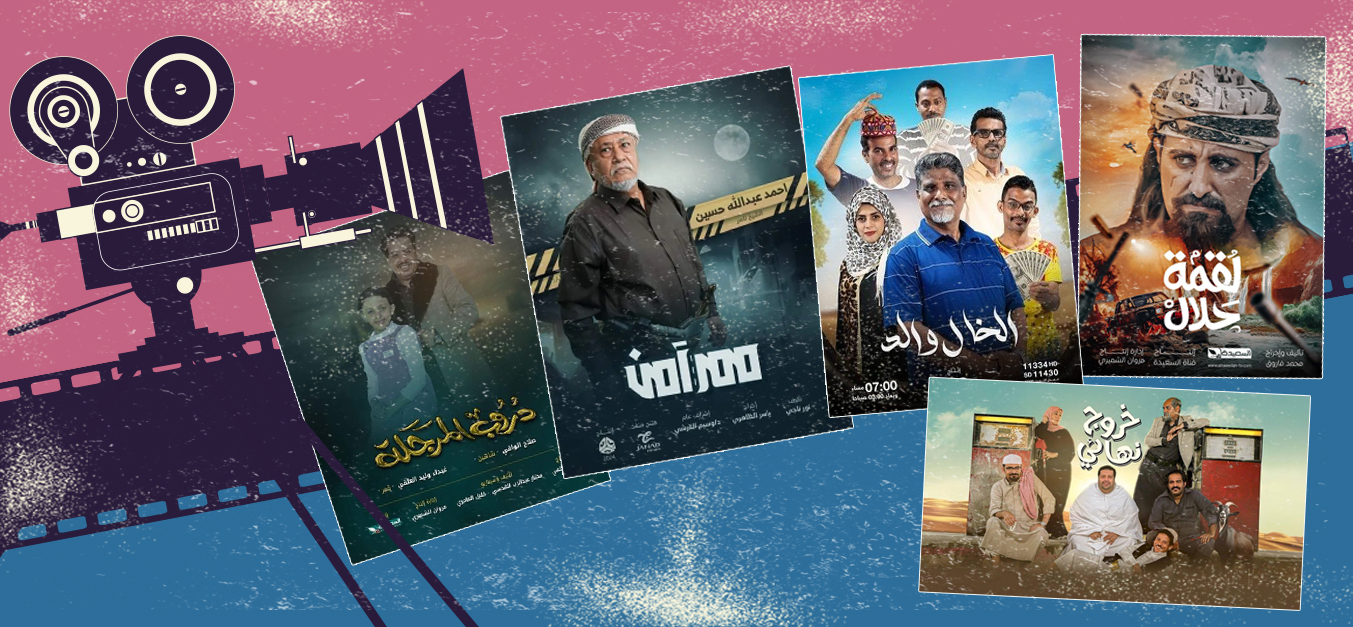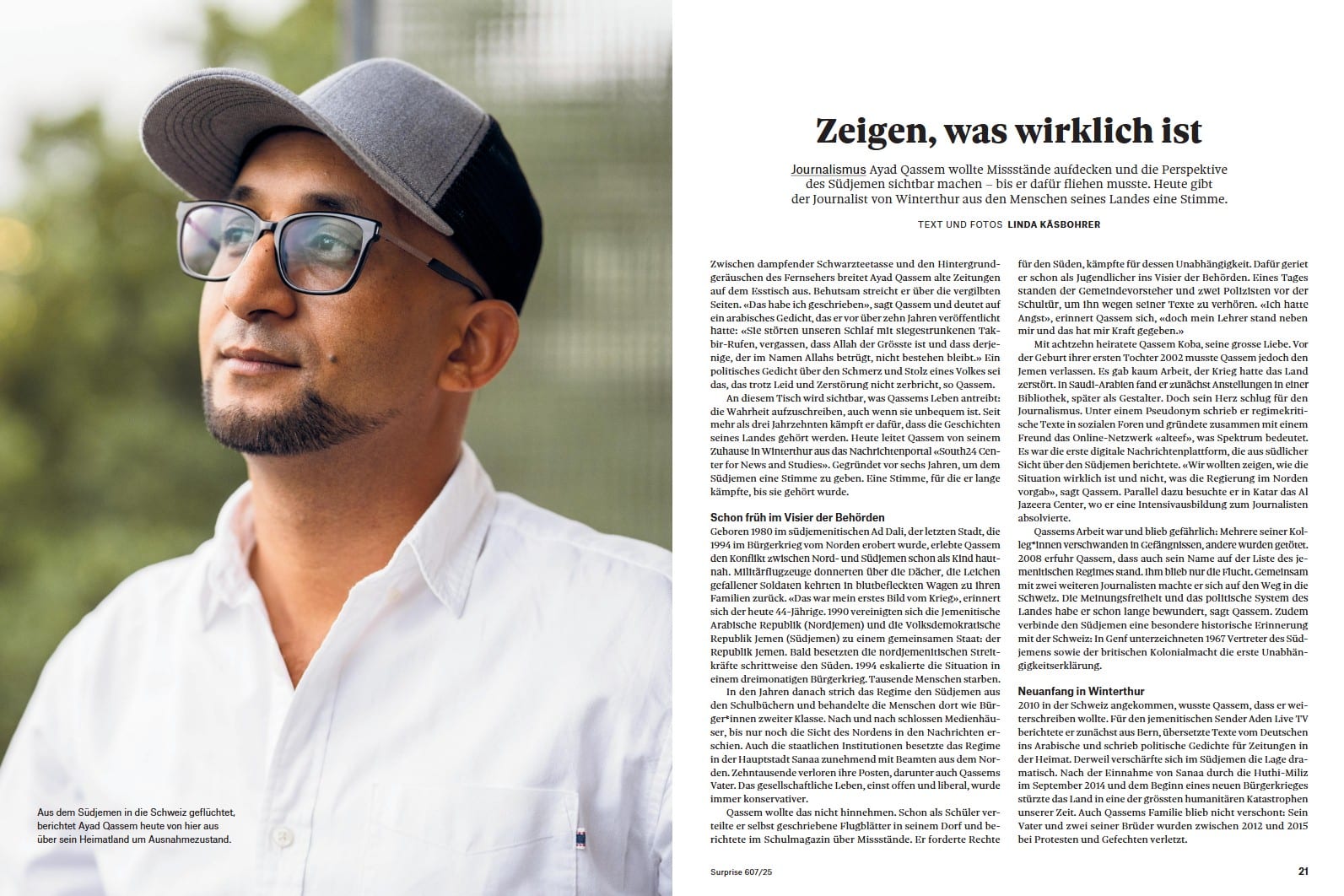
South24 Center
آخر تحديث في: 11-04-2024 الساعة 1 مساءً بتوقيت عدن
From the first day of Ramadan, the satellite channels in Yemen began broadcasting some series and dramas whose content varied according to the diversity of supporters and funders as well as the political parties owning these channels.
Abdullah Al-Shadli (South24)
The most prominent TV series being aired in Yemen include “Al Khal Walid” (The Uncle is A Father), “Maa’ Al-Dhahab” (The Gold Water), “Khoroj Nehae” (Final Exit), “Mamar Amen” (Safe Passage), “Dorob Al-Marjala” (The Roads of Manhood), “Qaryat Al-Waal” (The Village of Ibex), “Loqma Halal” (A Permissible Bite), and others.
Although the Yemeni drama production this year is considered the biggest in comparison to previous years, criticism and remarks about the content, the performances, the messages, and the technical aspects have also escalated.
Yemeni experts in this field maintain that there are several shortcomings that need to be addressed in order to enhance the quality of these creative works.
Weak Production
Adeni author and director Marwan Ali Mafraq said that “In the current Ramadan drama season, the technical aspects, such as the quality of camera work and costumes, are remarkably better than the previous years. However, they are still below the required standard amid a clear disparity evident between one TV series and another.”
He told ‘South24 Center’: “Production quality is the main reason behind this. Some channels produce high-quality series, regardless of the level of the content or the scenery. On the other hand, there are series that despite having good themes, plots and messages suffer from poor production.”
Mafraq, Assistant Director of the Adeni film “Al-Murhaqoon” (The Burdened), which has won international prizes, stressed that a strong production base is the core of success, regardless of the theme and scenic quality. He added: “There were many works this year. However, the problems weren’t related to their quality, but to production issues.”
He added: “The filming location is one of the factors affecting production. One of the things to be noted is that the TV series that were filmed abroad have better quality, in terms of images and the technology used.”
Explaining the reasons for the poor production values in Yemen, Mafraq said: “The poor capacity of the satellite channels is one of the most important reasons, especially the Southern channels. This is in addition to the lack of cooperation between the channels and other production companies, coupled with the negligible support provided by the relevant state institutions.”
According to him, “the TV series which are filmed in Yemen face many challenges, including the difficulties related to crowdedness in cities as well as managing limited space and time. Some channels start filming TV series just two months before Ramadan.”
These factors, according to him, are sometimes responsible for the poor standard of TV series.
Absent Plot
Yemeni art and literature critic Abdulfatah Al-Garash believes that the Yemeni TV series lacks good production values and lucid dialogue. He told ‘South24 Center’: “The dialogues in the Yemeni TV series are shoddy and don't attract viewers. In general, these TV series don't appeal to the intellect.”
He added: “The events portrayed in these TV series are limited to a certain area or tribe. They have no clear purpose or messages. I don’t think they will get much views if they are shown outside of Ramadan. We watch them as a matter of course during this month.”
He noted that “the Yemeni TV series lack many elements that could make them better, including paying attention to production and dialogues”. He said: “The Yemeni TV series should address all categories of the society.”
He added: “There is a need to bring in strong writers to compose the dialogues and connect the events with each other to reflect the complete reality. These TV series lack accuracy and coherence. They suffer from weak plots.”
Yemeni academic Dr. Rashad Al-Amiri, who specializes in literature and literary criticism, says that the Yemeni TV dramas are still stuck in the customary mode and don’t adequately address practical social matters. He told ‘South24 Center’ that “they focus on old values and traditions without paying attention to contemporary social issues.”
The Message and Content
While the Yemeni Ramadan TV series don’t discuss the practical issues as they should, they often include political messages that alienate the local audience.
For example, Episode 11 of the Yemeni series “Final Exit”, broadcast by the Almahriah Channel, affiliated with the Islah Party, delivered political messages that promoted the continuation of the Yemeni unity which is rejected by Southerners.
This episode featured two characters, the first of whom is from Aden and the second one from Sanaa. Both were on a car trip. Each one insistently asked the driver to play his favorite song. The first one asked for a song by Adeni artist Saad Abdullah, while the second character demanded a song by Sanaa artist Ahmed Al-Sindar. The dispute ended with playing of the second song after the driver voted for it.
The episode continued with its political messaging related to Yemeni unity. However, artist and critic Abdullah Bawazir doesn’t condemn such political messages within any dramatic and artistic production, provided that it is logical and doesn’t promote extremist ideologies.
He told ‘South24 Center’: “Such TV series that are broadcast with a political purpose won’t change the reality. The drama makers from the North basically address their societies, and not South Yemen. Keeping this in mind, we have to work at a fast pace and produce our own TV series and movies which reflect our own identity.”
The TV series “Hares Al-Bahr” (Guardian of the Sea), broadcast by satellite channels affiliated with the Houthis, is considered a prime example for using the special Ramadan drama shows to promote special political and religious ideas to impact the awareness of viewers. The TV series justifies the latest Houthi attacks on international shipping in the Red Sea and also calls for Houthi control on all the Yemeni territorial waters and islands.
The Southern Dramas
Contrary to the increased production of TV series by North, South has the TV series “The Uncle is a Father” as the most prominent and probably the only Southern production in Ramadan this year. The entertainment series, broadcast by ‘AIC TV’ (Aden Independent Channel), affiliated with the Southern Transitional Council (STC), tells the story of a rich man who returns to his home country from abroad. He plans to marry, but everyone around him is greedy for his money.
Moreover, local channels in Al-Mukalla and Seiyun in Hadramout produced some Ramadan works, limited to these cities. This includes the TV series “Al-Madara” by the Mukalla Channel.
In this regard, Bawazir said: “The Southern dramas have been attacked for many years. Even the Hadrami series “Shaban in Ramadan”* was attacked despite achieving great fame, and resonated throughout the Gulf.”
Bawazir spoke about the livelihood conditions in South Yemen and the sufferings of artistes across the year. He said: “Their suffering can't be described. The Southern artistes have no inclination for the issue of unity or partisanship. However, they are obliged to work in the Northern channels due to livelihood concerns.”
He added: “Anyway, the capabilities of the Southern channels can't be compared to the Northern ones. Most of the Northern channels, if not all, enjoy the support of parties, political entities, and states. They receive support from the Yemeni Information and Culture Ministry.”
Improving the Quality
Director Marwan Mafraq believes that focusing on good production is important for improving the quality of Yemeni drama series. He added: “This requires the availability of good stories, professional directors, distinctive filming, and sufficient budget.”
Mafraq also stressed that production should be scaled. “Good production isn't limited to money, but it means providing sufficient time.”
“This is in addition to training cadres on the most recent production technologies,” according to him.
Rashad Al-Amiri demands the use of classical Arabic in dramas. He said: “All Yemeni series don't use classical Arabic and heavily rely upon the Yemeni dialect. This reduces their audience.”
Al-Amiri called for the need to produce at least one Yemeni series every year using classical Arabic.
Prominent Hadrami actor Mahfouz Bajabir said: “Actors, artistes, and directors, especially the Southern ones, should be qualified and supported. Northern artistes receive grants and very huge sums of money in return for their participation in TV series.”
He pointed to the importance of establishing an institute of fine arts in Hadramout for the local artistes. “I submitted two letters to the former and current Hadramout Governor for this purpose. We haven't so far received a response. Nobody listens,” he said.
Despite the shortcomings befalling the Yemeni dramas and its seasonality that is limited to Ramadan as well as the aforementioned political interventions, they are an important spark of creativity in Yemen where the skies have been clouded with the smoke of war and military conflict for more than nine years. They serve as confirmation of the Yemeni’s creative spirit if they are given ample opportunities and peace.
*The Hadrami series “Shaban in Ramadan” began as a radio program authored and starred by Ahmed Abdullah Hassan with the participation of artist Afrah Mohammed Juma Khan by 2005. The series discussed social issues in a comical manner to attract the Hadrami audience. By 2009, the idea was developed into a TV series, broadcast by the ‘Yemen’ satellite channel following the success it had achieved as a radio series. However, the TV series witnessed the participation of Northern actors in the second part in 2009 and largely declined in Hadramout. Some Hadrami actors refrained from participating in it after receiving sharp criticism.

قبل 3 أشهر

قبل 3 أشهر